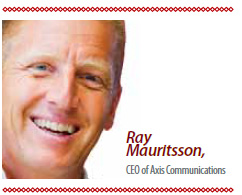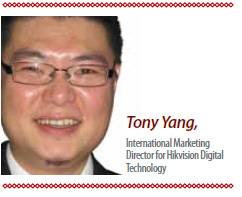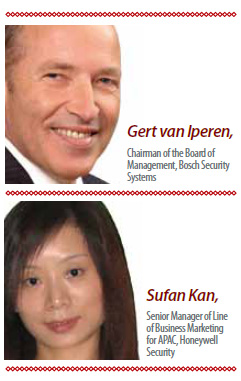Staying Power
Security has experienced the natural boom-bust cycle of all industries, when investment capital pours in and companies develop new products. One way to get growth in a slow market is to acquire it, resulting in a number of companies ending up in the hands of a few. 
For security, reliability is a key benchmark. Larger companies may have some advantages in providing a complete end-to-end solution, but ultimately, scale is not the deciding factor. “There may be some consolidation, but this is a strong and dynamic industry and one that will likely always attract new players and ventures,” Ng said.
While some level of consolidation is expected, security is unlikely to be dominated by a handful of players. “A handful sounds very low in a market that is today very fragmented,” said Ray Mauritsson, CEO of Axis Communications.
Other observers felt that the number of security players will only increase, not diminish. “A few factors are essential for companies to have staying power, such as having a sound understanding of the marketplace and a strong vision to grow regionally, and eventually globally,” said Toby Koh, MD of Ademco Security Group, a Southeast Asian system integrator. “As technology continues to advance, what will also set a successful company apart from the rest is its progressive approach to achieving breakthroughs in building more powerful and effective security systems at lower costs that will deliver a more competitive solution to that of the incumbent.”
 One of the key elements for companies to survive is to keep moving.” Looking back at security history, at every stage we've created lots of security companies,” said Tony Yang, International Marketing Director for Hikvision Digital Technology. “There was a boom in compression cards, then DVRs. But over time, many companies merged and integrated. I don't know if the overall number of security players will decrease, but what's for sure is the next stage will have another crop of players.”
One of the key elements for companies to survive is to keep moving.” Looking back at security history, at every stage we've created lots of security companies,” said Tony Yang, International Marketing Director for Hikvision Digital Technology. “There was a boom in compression cards, then DVRs. But over time, many companies merged and integrated. I don't know if the overall number of security players will decrease, but what's for sure is the next stage will have another crop of players.”
Finding the right people is crucial for companies to compete on a global level. “It is critical that companies invest in employees — from executives and salespeople to marketing and technical development professionals,” Gorski said. “Your employees are the face of your organization, and it is critical to hire an experienced and professional team.”
Innovate or Diminish
Once a company knows the market and has identified a niche, it has to develop solutions that address customer needs. This means that R&D spending should be immune to budget cuts for a company to have an edge. “Companies should continue to invest in down times,” said Marc Holtenhoff, CEO of Aimetis. “If you can execute to have the resources to survive and be successful, you will come out stronger if there's a downturn.”
Apart from consolidation, being a technology “fast forwarder” or innovator is the way to survive, said Simone Santambrogio, Product Management for Security Systems, Promelit.
Other companies are confident they have a manageable and sustainable model. “Milestone Systems will be one of the consolidators,” said Lars Thinggaard, President and CEO. “We invest 16 to 22 percent of revenue in R&D, and our product portfolio is being strategically expanded to compete, grow and attack all market segments.”
Solutions must provide flexibility for end users to adapt to their future needs. This could be a migration path to increase or decrease the size and scale of the solution or to enable the addition of new technologies as they emerge, Hussain said.
Quality technologies should meet user needs, rather than launching a new product each month that has no real value. “This is one thing to build a camera; it's really another type of activity to have a whole system work together and provide value to the end user,” Clocher said. Solution providers have the differentiation to combine all security applications — video surveillance, access control and intrusion — into a single integrated system, thanks to IP technology.
Covering All Bases
 Market pressures have resulted in Tier-1 brands moving from large projects to the midmarket. This year, Bosch Security Systems launched an “engineered software and solutions” division for highly complex projects requiring tailored project management, said Gert van Iperen, Chairman of the Board of Management. “At the same time, we are expanding our portfolio in the lower price segment for customers who aren't looking for holistic security systems. Those products are easy to understand, to use and to maintain. Quality and reliability always remain the same.”
Market pressures have resulted in Tier-1 brands moving from large projects to the midmarket. This year, Bosch Security Systems launched an “engineered software and solutions” division for highly complex projects requiring tailored project management, said Gert van Iperen, Chairman of the Board of Management. “At the same time, we are expanding our portfolio in the lower price segment for customers who aren't looking for holistic security systems. Those products are easy to understand, to use and to maintain. Quality and reliability always remain the same.”
Honeywell has also launched a new line for small security sites. It is not positioned to compete with bargain-basement products but offers a simple yet integrated solution for smaller projects. “The new line is to tackle the APAC region,” said Sufan Kan, Senior Manager of Line of Business Marketing for APAC, Honeywell Security. “In 2011, it's achieved three times of sales growth. We project the aggressive growth to continue in the next couple of years.”
Economic uncertainty isn't always bad, as it can become an opportunity to speed up time to market. “Strategic outsourcing can not only stretch the dollar in tight budgetary environments, but also create incremental sales opportunities with which Honeywell can pursue other pressing initiatives,” Kan said. “Global sourcing efforts can help Honeywell realign the current market realities.”